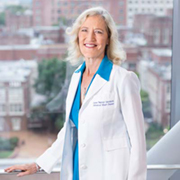Lynne Warner Stevenson, MD, FHFSA was named the 2021 HFSA Lifetime Achievement Award winner. Read a Member Spotlight Q&A with Dr. Stevenson >>
Learn more about the HFSA Lifetime Achievement Award >>
Lynne Warner Stevenson, MD was born in Joplin, Missouri and lived in Chicago and Los Angeles before joining the third class of women and first a cappella Tigerlilies at Princeton. Her MD was from Stanford and formal training finished at UCLA. She has been Director of Cardiomyopathy at UCLA, Brigham and Women’s Hospital, and currently at Vanderbilt. She shares a remarkable journey with her husband Bill, a pioneer in VT ablation, with whom she shares patients.
Awed early by miracles of transplantation and dismayed by the higher magnitude of need, she has consistently sought alternatives. Rewarded by a vigorous practice, her clinical quest is for clarity that is actionable, as with the wet-dry:warm-cold profiles, right-left mismatch, HFbetterEF, and INTERMACS levels. As a devotee of classic mysteries, her research themes include detection and relief of congestion, trajectories of cardiomyopathy, and decision-making beyond per-cents to per patient-centered outcomes.
Her trail is marked by leadership roles in ESCAPE, REMATCH and HF Network Trials, and by contributions to the design of INTERMACS and ICD registries, the “less sick” REVIVAL, algorithms for optivolemia, and HF hospitalization pathways. She has served on the FDA Cardio-Renal panel, and as associate editor for Circulation, the launch of Circulation Heart Failure, and currently JACC.
Lynne always writes from an outline and has contributed to over 30 national guidelines covering transplantation, HF (including the HFSA guideline of 1999), rhythm devices, and advanced decision-making. During 35 years, she supervised 2 NHLBI networks of young investigators and trained 55 fellows in advanced HF, half of whom are women. Her strong commitments remain educating to extend the patient-clinician connection and the role of advanced nurses, re-defining HF without congestion, exploring arrhythmogenic cardiomyopathies, and adapting evidence to personalize care for quality and length of life.

